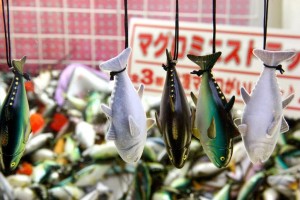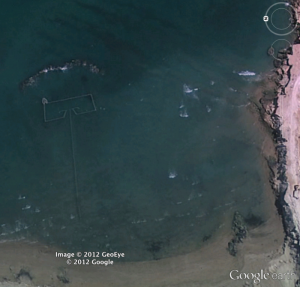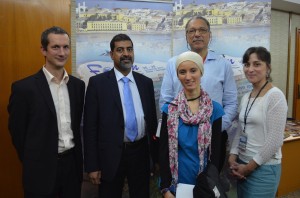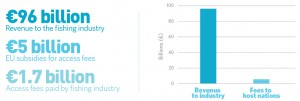
Tuna keychains are prizes in Tokyo’s version of the claw crane game; fresh or flash-frozen varieties available (© Laurenne Schiller )
by Laurenne Schiller
Typically, when I start writing about the situation regarding the decline of bluefin tuna [1] — which has been primarily driven by demand from the Japanese sashimi market since the late 1970s — my go-to introductory sentences include the words “luxury”, “expensive”, and “wealthy consumer”. The use of this terminology stemmed from a personal belief that bluefin was part of the upper echelon of gastronomic extravagance: the marine equivalent to a Kobe steak or Périgord truffles. Thus, you can imagine my complete surprise when I was in Tokyo this past month and saw it on the menu of every seafood restaurant in which I ate, or passed on the street. Literally, every single one — from 49th floor fine dining establishments, to curbside take-out lunch stands. I honestly could not believe that this fish was still so ubiquitous and, in many cases, inexpensive, when there is so much international pressure to reduce catches and allow for populations to recover.
Bluefin intrinsically holds a special place in my heart; it was the fish that made me decide to go into the field of fisheries science. And so, for me, the thought of eating it would be akin to how some people would feel about eating dog, or horse, or koala. Still, in going to Japan, I promised my travel companion that I would try everything. This decision was also based on one of my fundamental beliefs that in order to have an opinion (good or bad) on anything, it is important to have experienced it first-hand, and not simply judge based on hearsay or emotion. Still, I know that some may say that a fisheries scientist eating one of the most overfished species in the world could be considered hypocritical, so I will address that thought in a minute.
At any rate, we were less than two days into our travels in Japan when I had to live up to my word. Midway through a ten-course culinary extravaganza at a ryokan [2] in Hakone, I found myself staring at a small plate of beautifully arranged sashimi. I knew right away that two of the three pieces were bluefin. Although it might sound silly to some, it actually took me a while to get the nerve up to even poke at it with my chopsticks. All I could think about was when I had visited the world-class aquarium in Monterey Bay and seen these pelagic fish up close and personal for the first time. People sometimes wonder if fish can feel and perceive their surroundings; I guarantee that anyone who has ever looked a bluefin in the eye will know the answer to that question. However, I did my best to put sentimentality aside and kept true to my promise. And honestly, it was the most delicious fish I have ever eaten.
Tuna are everywhere in Japan. And I don’t just mean fresh tuna, but tuna culture. There are tuna mascots, tuna murals, tuna t-shirts, and keychains, and stickers, the list goes on. They even have those rip-off mechanical claw vending machines with tuna toys for prizes. It quickly became obvious that tuna is so much more than just a fish — it is a key component of modern Japan’s cultural identity. And bluefin is the most iconic of all. However, as mentioned above, populations of this species continue to be rapidly overexploited with no serious conservation or fishing targets in place. So, in addition to attending a joint symposium on current ocean issues, the other purpose of my trip to Japan was to serve as a rapporteur among a small group of fisheries scientists. Although the agenda was quite unstructured, the overall aim of our gathering was to discuss current and potential management strategies for Pacific bluefin tuna.
Alas, my revolutionized view of Japanese tuna culture combined with a trip to the morning bluefin auction at Tsukiji Market, and four days of intense discussion on all matters scientific, economic, and political, has made me realize that this is a far more complicated issue than simply setting quotas or raising consumer awareness. Perhaps unlike any other wild biological field, fisheries science is unique in that the wellbeing of the studied organisms has a direct connection to the wellbeing of humanity at large. While my friends have asked me why I want to save the fish, this is not a complete representation of why I do what I do. I don’t just want to “save the fish”. Personally, yes, I do think that bluefin are much more beautiful in the wild than on a plate, but I understand that I am in the minority on this matter. So, ultimately, my goal as a fisheries scientist is to ensure they can survive sustainably into the future as both a vital component of their natural marine ecosystem and also as food for those who enjoy them in that manner.
Which brings me back to my aforementioned point on hypocrisy. In addition to the overarching goal of finding a sustainable fishing solution for bluefin, I study these fish with the hope of being able to provide accurate information to the public so that they may make informed decisions about what they choose to eat. I do not think it is about telling others what to do, but rather about making sure people are aware that there is an ecological cost to everything we do in life; I understand that in going to Japan to (hopefully) do some good for tuna and tuna fishers, I substantially increased my carbon footprint as a result of the flights it took to get there. Ultimately, however, it is important to decide how to act based on all available information. With regard to eating bluefin, I was completely aware of the ecological impact of my decision. And, for me, the cost to long-term sustainability outweighs however much I enjoyed its taste. So, while I can now understand why people love to eat it, I will refrain from doing so again.
[1] There are three species of bluefin tuna, each residing in a separate part of the world. However, all of these species have undergone dramatic stock depletions since commercial fishing began.
[2] Traditional Japanese inn.
 In the Persian Gulf, large, semi-permanent fish traps take advantage of tidal differences to catch a wide variety of marine species. These traps, called fish weirs, have been used around the world for thousands of years, but only recently have researchers quantified what they catch using imagery captured from space.
In the Persian Gulf, large, semi-permanent fish traps take advantage of tidal differences to catch a wide variety of marine species. These traps, called fish weirs, have been used around the world for thousands of years, but only recently have researchers quantified what they catch using imagery captured from space.




